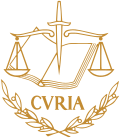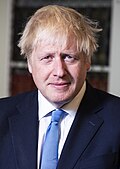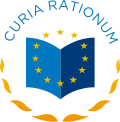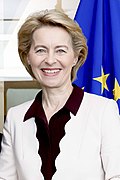Portal:European Union
Introduction
The European Union (EU) is a supranational political and economic union of 27 member states that are located primarily in Europe. The union has a total area of 4,233,255 km2 (1,634,469 sq mi) and an estimated population of over 449 million as of 2024. The EU is often described as a sui generis political entity combining characteristics of both a federation and a confederation. Containing 5.5% of the world population in 2023, EU member states generated a nominal gross domestic product (GDP) of around €17.935 trillion in 2024, accounting for approximately one sixth of global economic output. Its cornerstone, the Customs Union, paved the way to establishing an internal single market based on standardised legal framework and legislation that applies in all member states in those matters, and only those matters, where the states have agreed to act as one. EU policies aim to ensure the free movement of people, goods, services and capital within the internal market; enact legislation in justice and home affairs; and maintain common policies on trade, agriculture, fisheries and regional development. Passport controls have been abolished for travel within the Schengen Area. The eurozone is a group composed of the 20 EU member states that have fully implemented the EU's economic and monetary union and use the euro currency. Through the Common Foreign and Security Policy, the union has developed a role in external relations and defence. It maintains permanent diplomatic missions throughout the world and represents itself at the United Nations, the World Trade Organization, the G7 and the G20. Due to its global influence, the European Union has been described by some scholars as an emerging superpower.[needs update] In 2012, the EU was awarded the Nobel Peace Prize. In 2020, the United Kingdom became the only member state to leave the EU; ten countries are aspiring or negotiating to join it. (Full article...) Selected article The Galileo positioning system is a proposed satellite navigation system, to be built by the European Union as an alternative to GPS (which is controlled by the United States military) and the Russian GLONASS. The system should be operational by 2010, two years later than originally anticipated. The first stage of the Galileo program was agreed upon officially on May 26, 2003 by the European Union and the European Space Agency (ESA). It is named after the Italian astronomer Galileo Galilei. The Galileo positioning system should not be referred to as GPS, which refers specifically to the existing United States system, but as "Galileo." Galileo is intended to provide: greater precision to all users, improved coverage of satellite signals at higher latitudes, which northern regions such as Scandinavia will benefit from, a positioning system upon which European nations can rely even in times of war or political disagreement. Selected pictureBelém Tower is a fortified tower located in the Belém district of Lisbon, Portugal. It is a UNESCO World Heritage Site (along with the nearby Jerónimos Monastery) because of the significant role it played in the Portuguese maritime exploits of the era of the Age of Discovery. The tower was built in the early 16th century and is composed of a bastion and the 30 m (98 ft) tall tower. It is dedicated to the patron saint of Lisbon, St Vincent, and commemorates the expedition of Vasco de Gama.
Did you know?... that the presidency of the EU Council rotates every half year? ... that the EU parliamentary election is the world's biggest transnational election? ... that the European Union was awarded the Nobel Peace Prize in 2012? Selected cityBerlin is the capital city and one of 16 states of Germany. With a population of 3.4 million people, Berlin is Germany's largest city. It is the second most populous city proper in the European Union. Located in northeastern Germany, it is the center of the Berlin-Brandenburg Metropolitan Area, comprising 5 million people from over 190 nations. Geographically embedded in the European Plains, Berlin is influenced by a temperate seasonal climate. Around one third of the city's territory is composed of forests, parks, gardens, rivers and lakes. First documented in the 13th century, Berlin was successively the capital of the Kingdom of Prussia (1701–1918), the German Empire (1871–1918), the Weimar Republic (1919–1933) and the Third Reich (1933–1945). During the 1920s, Berlin was the third largest municipality in the world. After World War II, the city was divided; East Berlin became the capital of East Germany while West Berlin became a de facto West German exclave, surrounded by the Berlin Wall (1961–1989). Following German reunification in 1990, the city regained its status as the capital of all Germany hosting 147 foreign embassies. Berlin is a world city of culture, politics, media, and science. Its economy is primarily based on the service sector, encompassing a diverse range of creative industries, media corporations, congress and convention venues. Berlin serves as a continental hub for air and rail transport, and is one of the most visited tourist destinations in the EU. Significant industries include IT, pharmaceuticals, biomedical engineering, biotechnology, optoelectronics, traffic engineering, and renewable energy. The metropolis is home to renowned universities, research institutes, sporting events, orchestras, museums and personalities. The urban and historical legacy has made it a popular setting for international film productions. The city is recognized for its festivals, diverse architecture, nightlife, contemporary arts, public transportation networks and a high quality of living. Berlin has evolved into a global focal point for young individuals and artists attracted by a liberal lifestyle and modern zeitgeist. General imagesThe following are images from various European Union-related articles on Wikipedia.
TopicsFeatured contentFeatured articles
Featured lists
Featured contentGood articles
CategoriesRelated portalsAssociated WikimediaThe following Wikimedia Foundation sister projects provide more on this subject:
Discover Wikipedia using portals |



































































